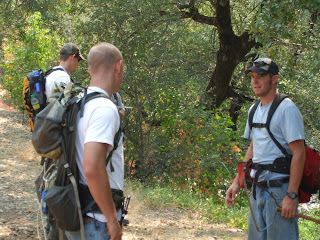+022.jpg)
Hello everyone!
Well, we just passed our eight week mark a few days ago, and all appears to be going well. It's been a hectic ride so far, mainly on account of India Company. As I mentioned in my last post, the first six weeks of school were filled with fairly intense training for Navy ROTC, our initiation process if you will. By the end of it all, however, we were learning how to have fun with it. It still wasn't the most pleasant experience, but our superior officers began to lighten up over the final days, and we realized that they were having a heck of a lot of fun and that they were really very nice and fun people. My Platoon Commander is one of the sweetest girls ever, so it was really quite humorous seeing her "morph" back into her normal self. Even though they're technically my peers now, I still have a tremendous amount of respect for them, and it's been hard not calling them "sir" or "ma'am". I ran into one of the other platoons' sergeant instructors two days before Fall Review and as I walked past he said "'SUP SAL?". I responded with "how are you sir?" He said "woah, wait, noooo no no. Repeat after me: 'what's up?'. You're out of India now, relax man." I still have training three times a week (hopefully I'll get it down to twice a week soon), but now I'm training with a friendly, supportive group of fellow students.

Fall Review was a very encouraging experience. Several high ranking military figures were there (Rear Admiral Joseph P. Mulloy, Commander of the Pacific Fleet swore us in) and the formality really stressed the importance of the event. The most fun, however, was wearing our white uniforms together. We look pretty snazzy, I must say. Note the photos.

Everything else has been fairly standard procedure. The week after Fall Review brought us midterm exams (gee, thanks!). However, with midterms brings fall break! Now, I learned an important lesson here: don't stay on campus unless you have to! And plan your events carefully. I stayed on campus so that I could go to a concert Tuesday night (which was incredibly fun!), but that meant missing out on really anything else this break. I was okay with that, and I thought that it would just be a nice relaxing time to unwind and get some work done. Well... when there's nobody on campus... it is relaxing but it's also very boring. You really have to make an attempt to get out and go somewhere. So, lesson learned. I caught up on sleep, I caught up on some other things I needed help with, and I burned a couple hours watching Family Guy trying not to think about how there wasn't anybody to hang out with.
Regarding things you thought might have changed when I went to college: I'm still single, and I still plan to play rugby. I went to a practice and it was REALLY, REALLY FUN, but at the moment my schedule with the Navy conflicts with practice times. Next semester I should have time to practice with them, and it's supposed to be more relaxed in the spring anyways.
As always, please email or call. I'm not going anywhere!
God bless,
Joe











